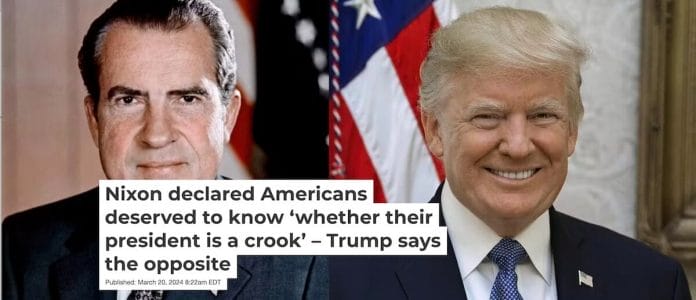
One of the four criminal trials of Donald Trump was slated to start in the next few days, but has been delayed on procedural grounds. There was a time when it appeared possible all of his trials could happen before the November election. Now it is unclear whether even one will begin in time. As a result, on Election Day, the voting public may not know a key fact about candidate Trump: whether a jury has found him guilty of one or more crimes.
Spencer Goidel, Auburn University
Like Trump, scandal followed Richard Nixon throughout his political career. And, like Trump, Nixon always managed to claw his way back into the political forefront.
As a scholar of American politics and public opinion, I believe the parallels between Trump and Nixon are clear.
Yet there is a telling difference between the two men. Nixon acknowledged the fundamental importance of accountability in a democracy. He went so far as to famously declare – during the height of the Watergate scandal – that “people have got to know whether or not their president is a crook.”
Trump, on the other hand, outright rejects the assertion that the American people should be able to find out what the justice system says about whether a prospective president is a crook.
In fact, he has gone so far as to assert that the “president of the United States must have full immunity, without which it would be impossible for him/her to properly function.”
Nixon made a similar statement in 1977, telling British journalist David Frost in 1977 that “when the president does it … that means that it is not illegal.” But Nixon hastened to add a crucial caveat that he was talking about war powers and national security, and specifically emphasized that he did not “mean to suggest the president is above the law.”
Afterward, Nixon responded to the backlash from the interview, writing a long-winded clarification that reiterated that the president is not above the law.
Similar, but quite different
Superficially, Nixon and Trump’s brands of politics share a lot of similarities.
Both men positioned themselves against allegedly crooked liberal elites and used the fact that they were being investigated as evidence that the people in power were trying to silence them and people like them.
As far back as 1952, Nixon was accused of keeping a secret stash of donor funds when he was a U.S. senator and a candidate for vice president. His fate as Dwight D. Eisenhower’s running mate in that year’s presidential election looked increasingly uncertain.
His instinct was to go public. On live TV, in what came to be known as the “Checkers speech,” Nixon took his case directly to the American people. He positioned himself – an ordinary American with two mortgages, a bank loan and a loan from his parents – against the political elite. That elite, Nixon said, believed only rich men should be in politics, and Nixon was just a regular guy.
More than two decades later, Nixon, again facing disgrace, took his case to the public. The Watergate scandal, in which Republican operatives sought to secretly listen in on Democratic Party business, broke in the summer of 1972. Even before that year’s election, Nixon’s White House aides and his campaign were linked to the effort. Nixon went on to win every state but Massachusetts in the Electoral College.
His popularity peaked at 67% in late January 1973 following the inauguration for his second term. However, as the Watergate scandal unfolded, Nixon’s personal involvement in the spying and attempts to cover it up became increasingly clear to the public. His popularity plummeted.
One year after a landslide Electoral College victory, only 27% of Americans approved of the job Nixon was doing as president. In that context, Nixon made a public plea of innocence and forthrightness, declaring that the “people have got to know whether or not their president is a crook.” And he immediately followed that statement with a lie: “Well, I’m not a crook.”
A contrast in support, and tactics
Nixon’s instinct to make his case to the American people in the face of political peril emphasizes a key difference from Trump.
Throughout his first term, Nixon enjoyed substantially higher approval than Trump. On average, 56% of Americans approved of the job Nixon was doing in his first term, compared with only 41% for Trump. Liberal elites may have decried Nixon’s claim that he had the support of a “silent majority” at the time, but from a historical perspective, his popularity is undeniable.
Trump’s approval tells a different story and illustrates the differences in the breadth and depth of their support. In February 1972, 52% of Americans approved of the job Nixon was doing: 80% of Republicans, 51% of independents and 36% of Democrats. Compare that with Trump’s approval in February 2020: 47% overall approval, 92% approval among Republicans, 42% with independents and 8% with Democrats.
While most recent polls show that Trump is leading in 2024’s apparent rematch of the 2020 election, he rarely eclipses the 50% threshold. Trump is president of a vocal minority, not the silent majority. Trump doesn’t have to appeal to Democrats, or the median voter for that matter, because he has the undying support of his faction. And the U.S. system of electing presidents is biased in a way that means his vocal minority can deliver victory.
Spencer Goidel, Assistant Professor of Political Science, Auburn University
This article is republished from The Conversation under a Creative Commons license. Read the original article.



